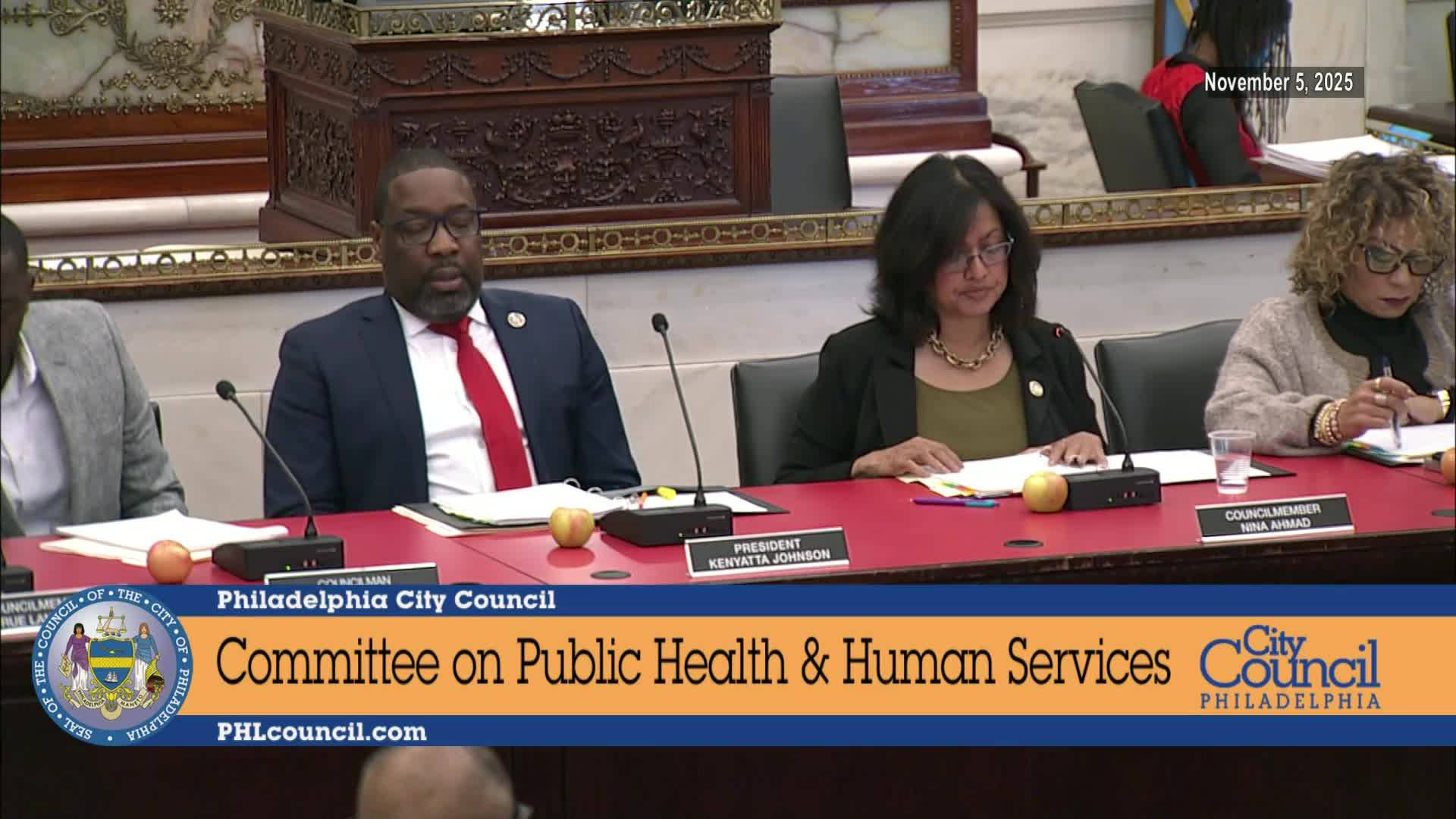Council hearing: SNAP partial payments and loss of SNAP‑Ed put Philadelphia families and local food system at risk
Get AI-powered insights, summaries, and transcripts
Subscribe
Summary
A Philadelphia City Council hearing on Nov. 5 heard testimony that a partial federal SNAP payment and elimination of SNAP‑Ed funding have created an immediate and large shortfall for Philadelphia households and organizations that feed them.
A Philadelphia City Council committee hearing on Nov. 5 examined how a sudden federal funding disruption and policy changes are affecting the Supplemental Nutrition Assistance Program (SNAP) and SNAP Education (SNAP‑Ed) in the city.
The Committee on Public Health and Human Services convened to consider Resolution 250,936, which directs hearings to "examine the impacts of the current crisis threatening the supplemental nutrition assistance program, SNAP, and supplemental nutrition assistance program education, SNAP‑Ed, on food and nutrition security in Philadelphia," Chair Nina Ahmad said at the opening. "This crisis is man made," Ahmad said, adding that the disruption is imposing immediate harm on families who rely on SNAP.
Why it matters: The federal government’s decision to make a partial November SNAP payment from a $6 billion contingency fund — and the accompanying elimination of SNAP‑Ed funds — means many Philadelphia households face smaller benefits, delayed EBT loading and fewer nutrition‑education resources. Renee Garcia, city solicitor, told the committee two rapid federal lawsuits are active (in Massachusetts and Rhode Island) and that the federal partial payment was chosen over tapping additional federal funding; Garcia said Pennsylvania is likely to receive roughly half of a typical monthly allotment for November and that details about state timing and card loading remain uncertain.
What city officials told the committee: Orlando Rendon, executive director of the Office of Community Empowerment and Opportunity, said the Park administration and the mayor’s "1 Philly SNAP support plan" directs immediate city resources to food distributors and a streamlined small‑grant program for community organizations. Rendon said the city would deploy $4 million in city funds for food distribution partners and rapid grants, while philanthropic partners committed $6 million handled separately by philanthropy. Committee members repeatedly pressed city counsel and administration staff for clarity on when funds would reach recipients’ EBT accounts and whether there are plans to provide direct cash or gift‑card payments. Renee Garcia said the partial payment was ordered but timing for EBT card loads was unclear.
Legal and policy context: The city solicitor explained the litigation and the contingency‑fund math: $6 billion in the contingency account was insufficient to cover full nationwide need; roughly $4.65 billion was allocated for SNAP November payments with the remainder split among other uses and administrative costs. Garcia said the litigation and agency choices were evolving rapidly and warned that some questions about legal strategy must remain privileged.
SNAP‑Ed and education programs: Witnesses from the School District of Philadelphia and community nutrition providers described a separate but related threat: elimination of federal SNAP‑Ed funding. The district’s Eat Right Philly program and partner initiatives provide classroom cooking, school produce distributions and SNAP‑Ed‑led family programs. Lauren Macedo, the district’s nutrition education director, said SNAP‑Ed funding may sunset partner programs at the end of the 2025–26 school year. Multiple nonprofit educators told the committee that SNAP‑Ed has been a major vehicle for producing measurable improvements in diet and for connecting families to local produce.
On the ground: Share Food Program and Philabundance reported rapid spikes in demand comparable to pandemic peaks. George Matysik of Share said his network has seen a 120% increase in demand over three years and a 12‑fold spike in new pantry registrants in recent days. Lori Jones Brown of Philabundance said the nonprofit committed to a 25% monthly increase in distributed meals (about 600,000 additional meals monthly at an estimated cost near $1 million) but emphasized that charitable food networks cannot fully substitute for SNAP.
Legal services and work rules: Mackenzie Libby of Community Legal Services said paperwork, missed renewals and new time‑limit rules pose a clear risk of benefit loss; new federal work requirements (phased in Sept. 1 and Nov. 1) expose many adults to a three‑month limit unless they document exemptions. Libby also warned that changes to immigrant eligibility could remove some lawful immigrants from SNAP at their next renewal.
City steps and open questions: The administration described a multi‑pronged emergency response: a $2 million immediate allocation to two large food distributors, $2 million in simplified grants to community organizations (applications processed in days), a city reallocation of $1 million in DHS funds for targeted gift cards for child‑welfare/prevention families, $1.5 million in emergency rental assistance for furloughed federal workers, and temporary revenue deferrals for city residents facing momentary hardships. City officials also described a texting and direct‑outreach campaign using PA DHS data to identify and notify affected households. Council members repeatedly pressed for the city to consider direct payments or expanding gift‑card approaches as the fastest way to put food on household tables.
What the committee will do next: Council members asked for follow‑up details on the philanthropic $6 million, the timetable for EBT loading, the city grant rubric and reporting, and data the city will use for targeted outreach. Chair Ahmad closed the hearing with requests for written follow‑ups from city departments and nonprofit partners, and committee staff said they would track the litigation and administration follow‑up closely.
Bottom line: Committee members and witnesses agreed on the urgency — partial federal funding and the loss of SNAP‑Ed funding have immediate consequences for food access, nutrition education and the local food economy. City and nonprofit leaders reported rapid emergency action but stressed that emergency grants and food bank scale‑ups do not fully replace SNAP’s monthly buying power or SNAP‑Ed’s education role.
